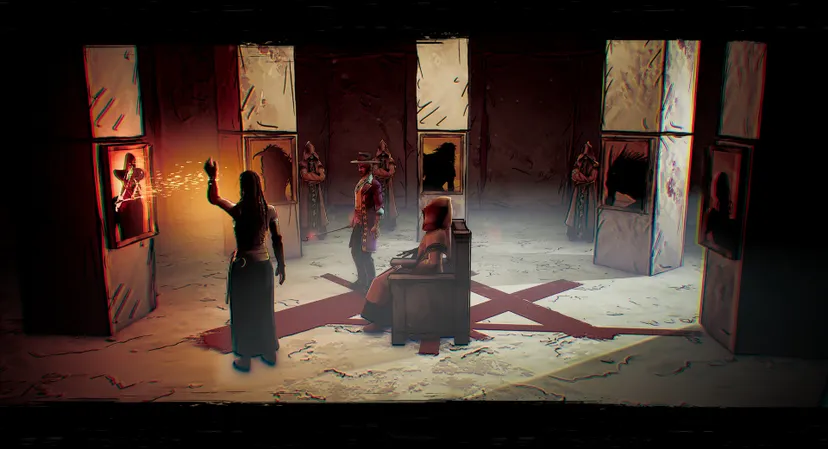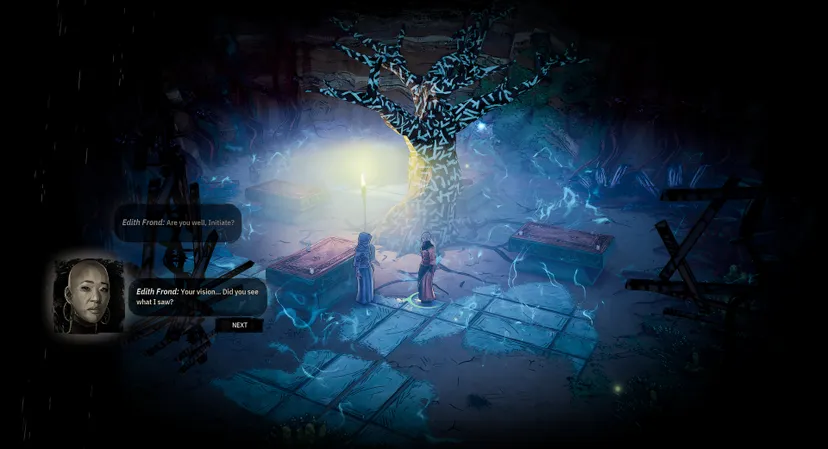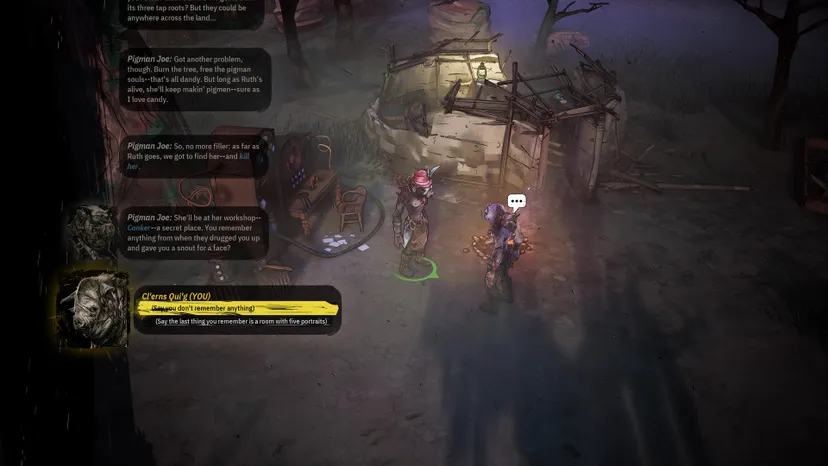Weird West scribe Erin Firestine on the complexities and intricacies of narrative design
"I have to be constantly accounting for every single possibility that could occur and there's a ton of writing that goes into that."
Before Erin Firestine joined indie developer Wolfeye Studios as a narrative designer, she began her writing journey with a short story about her runaway hamster. "My mom was like, 'You should be a writer when you grow up,'" says Firestine, "and I was like, 'No, that's too much work.'"
After contributing to webcomics and graduating with a bachelor's in creative writing, Firestine still couldn't see a path to go professional. "I was sort of drifting a little bit trying to make ends meet," she says.
It wasn't until she watched an in-depth interview feature on Laurence Schick, loremaster for the
Elder Scrolls series preparing for the launch of
Elder Scrolls Online, that she learned that a writing career in video games was a possibility. "He posted a video talking about his job," Firestine remembers, "and how it was sort of his responsibility to make sure all of the games in the
Elder Scrolls series used the right lore and was consistent in building a world that was real and living." Not long after, Firestine found a new objective to keep her motivated: "'I want that job,'" she remembers thinking, "Whatever I needed to do to get that -- I wanted it."
At the time, Firestine was working at Austin Community College and enrolled herself into the game design program, earning an associate's degree and getting to know instructor Rich Wilson, who was then Lead Level Designer at Arkane Studios, who recommended her when colleague Raphael Colontonio was looking for writers to help craft his new studio's debut title. "It feels like a series of lucky stumbles," Firestine says.
But after nearly two years of working with the development team on
Weird West, Wolfeye's isometric RPG, Firestine couldn't be happier with what she's accomplished. "It's been a pretty serious ride," she says. "We've packed a ton of really good work into a very short period of time. Once we've shipped it and I've had a chance to sleep I'll be very proud of it!"
While Firestine wasn't always into video games, she enjoyed watching her little brother jump and fly his way through the
Spyro series. Later on, Firestine took part in communal game nights at her college dorm, where students from multiple floors would meet in the middle common area to play mostly single-player games from such series as
Resident Evil or
The Legend of Zelda with accompanying commentary from friends. But she wasn't truly hooked until
The Elder Scrolls IV: Oblivion. "It was such a true and genuine world," says Firestine, "I'd never seen anything like it. I got immersed so quickly and I just wanted to live in that world as much as possible."
But currently,
Final Fantasy XIV is what has truly captured Firestine's heart. "It would be pretty awesome to build a game that had that level of joy and love in it," she says. "I would really enjoy spending a really long period of time with the same set of characters and watching how their stories interact over time and how we can extrapolate new stories going forward. I think going with them on their journey would be a rewarding experience for sure."
Firestine finds inspiration in complicated characters who slowly reveal themselves to the player, specifically citing
FFXIV's Thancred. "When you first meet him," she explains "he's sort of introduced as this smooth-talking, compliment-dropping womanizer but you learn relatively early on that he's got a lot of issues with inadequacy and self-esteem."
"[
God of War'
s] Kratos is another great example," she adds. "On the surface he's just this murderous badass but the longer you spend with him the more you realize how much pain he's in and how much anger he has and how he recognizes that he's a monster and has to live with that. I love that duality!"
"That's one of the reasons
Weird West has been a lot of fun to work on," says Firestine. "Practically every character in the game has something like that. Their surface appearance and the monster inside -- sometimes literally! It's been a lot of fun."
In order to make complex characters players will gravitate to, Firestine draws upon her history writing fanfiction. "Fanfic writers," she explains, "will take the tiniest detail and extrapolate it into this beautiful fractal of possibilities that the original writers might never have considered." For Firestine, it's eye-opening to be on the other side of the creator/fan relationship, experiencing the satisfaction of "putting those little details in and hoping people connect the dots."
But the nature of game development means writing and systems can rub up against each other in unexpected ways. "Our first goal is to make sure everything functions," says Firestine. "Our second goal is to make sure the player understands everything that's going on. Then after that we can worry about making it beautiful. But first you have to figure out what you're supposed to be doing next. If we can meld those two goals -- that's the dream."
For Firestine, "the ultimate moment of gameplay and narrative cohesion" comes from the original
God of War released in 2005. She describes a
sequence that requires the player to offer a living sacrifice to open a locked door. Said sacrifice is a caged soldier, who pleads for his life as Kratos pushes him up a ramp to the mechanical altar. Enemies then spawn into the level, halting the players' progress and forcing them to release the cage, letting it slide downward away from their goal, and fight. Upward progress is made in small chunks between battles, while the soldier's cries persist throughout.
"I realized that they're putting that murder in the player's hands," says Firestine. "You are participating in this horrible crime that Kratos is commiting. You're right there with him. It's that moment, for me, that I really understood what Kratos was going through. He had one goal, he had one possible path before him, and he was willing to do whatever it took to achieve that goal even if it meant becoming a monster."
Weird West is taking a different tack to narrative, one that provides an experience that is more emergent. "There's a lot of procedural generation going on," says Firestine, "and writing for that has been a really fascinating challenge."
"Ours is a pretty set storyline but the world itself is very open," she explains, "I have to be constantly accounting for every single possibility that could occur and there's a ton of writing that goes into that." Firestine describes her responsibilities as threefold: creating genuine reactions from NPCs that don't become repetitive, offering players' ways to role-play with a wide variety of choices that suit their character, and fleshing out the gameworld with intriguing moments that contribute to the overall narrative.
"It's much less prose writing and much more building a box of LEGOs," Firestine says, "You're not even building the things out of the LEGOs. You're just seeing what the world will do with them and what the players will do with them. We're so excited to see what happens when the player gets a hold of it because there's a lot of stuff that not even we will be able to predict."
Game development requires a significant amount of time and effort and the complicated nature of
Weird West's narrative systems compound the team's growing workload. "It's tough," Firestone admits, "that's the major downside to the job I'm doing - is all the stress. It makes a difference that I'm excited about the project and I love the people I work with but if neither of those things were true or even one of them wasn't true I would be having a much harder time."
There's no shortage of games industry horror stories that detail the fallout of overworking combined with poor people management. "That's definitely something everybody looking to get into this industry needs to be aware of," says Firestine, "It's such a high-stress environment that if you end up with a team that's not supportive, to put it politely, then it can really make things worse."
Luckily for Firestine and the rest of the
Weird West team, Wolfeye has adapted well to its all-remote development environment. "I feel very lucky and privileged to be working with a team that's very supportive and very kind and loving to each other," says Firestine, "We're very fortunate to have Julian Roby as our producer -- he is a badass. He was put on this earth to solve problems and make things happen. He's been at the forefront of making sure everybody is able to communicate and get what we need to different people and making sure we have the tools we need and are connected to the right people -- that makes a huge difference!"
In a myriad of ways, Firestine's first role in the games industry has been an intense learning experience. "A lot of it has to do with my personal struggles with stress and anxiety," she says, "One of the reasons I relate to Thancred from
FFXIV so much is I have a lot of issues about being good enough and doing enough to stick around and making sure that everybody likes me."
"It's occasionally been a kind of pitfall for me to fall into," Firestine continues, "'If I just put in 70 hours of work this week then everybody will love me,' but it doesn't work like that -- it really doesn't. Having to disconnect those two desires, those two drives and instincts is very challenging and that's something that anybody with anxiety should think about."
For Firestine, the challenging work put into making
Weird West has helped her understand what she finds truly important. "It's sort of forced me to realize that the world is not going to end if I miss a deadline," she says, "It's learning to prioritize - it's learning to communicate with people if things go wrong." She continues, saying, "Collaborating with people has helped a lot. I've learned a lot about trusting my team and trusting myself."

The theme of trust and managing her own expectations extends into another of Firestine's great joys and stress-relievers - gardening. "There's so much in gardening that you can't control at all," she says, "In software development, you have to control everything. It gets overwhelming and exhausting trying to keep a leash on every single thing in your area of influence. In gardening, you can do your best with fertilizer and soil and picking plants that are right for the spots that you put them in but at a certain point it's up to the plant -- you just have to wait. You just have to sit there and wait for it to grow. That's just so freeing, in a way."
She says that working in the games industry is about being realistic with expectations for yourself and others. "It's occasionally deceiving going into an industry like this and you expect to enjoy yourself all the time," she reflects. "'You're working in games, you're a game writer. You should be thankful.' And I am thankful but there have also been days where it has been so hard and it's up to each individual person to decide if it's worth it."
But ultimately, Firestine feels she is in the right place. "For me it is [worth it] to be in the room where these decisions are being made and getting to see what's possible with what we create. But it's not going to be worth it for everybody and there's a reason why there's only a five year tenure in the industry. And I think that's something I think the industry needs to work on."
Firestine affirms her anticipation for sharing her work with the world.
"Weird West felt a lot like getting tossed headfirst into the deep end," she says, "an immersive sim with the incredible demands on dialogue it needed fulfilled was definitely not the simplest place to start a career in game writing!"
Now that the project is out of her hands, Firestine has the space to reflect on how much she learned. "The big lesson I can take away here is to look at the systems first," she says, "Game writing is half or more systems design at its heart and it's way more fun than you think!"
Firestine's next adventure is with another fully-remote studio called Twin Suns Corp, working on an as-yet-unannounced project that she's looking forward to helping usher into the world.
































